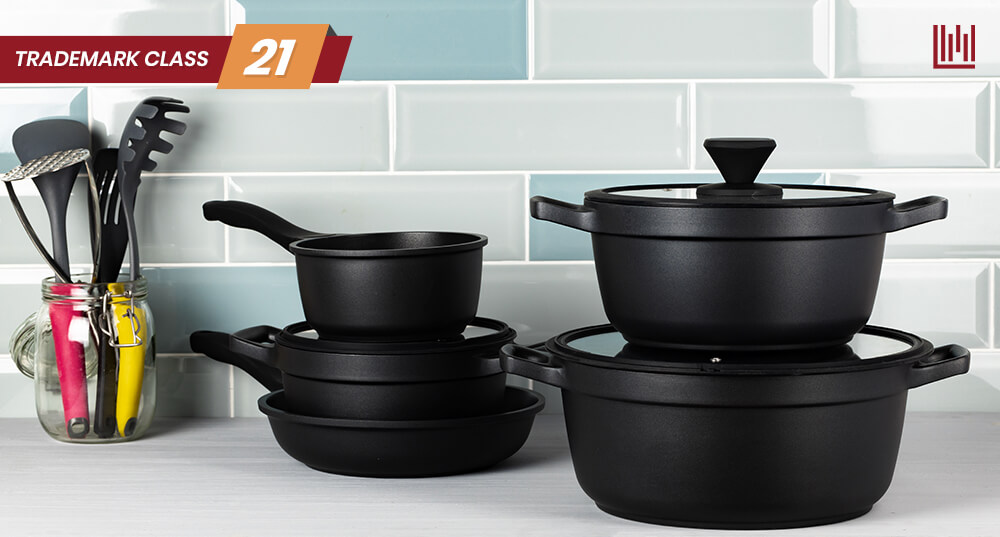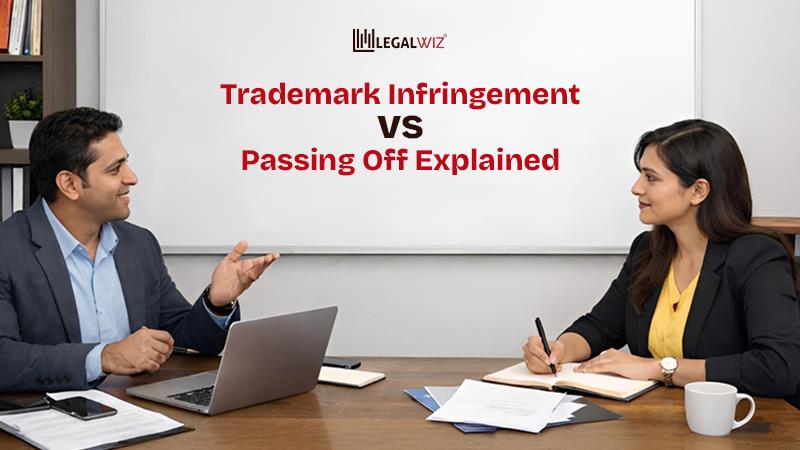Trademark Class 21 for Protecting Kitchenware & Household Product Brands
If your business deals in kitchenware, cookware, storage containers, or cleaning tools, your brand must be registered under Trademark Class 21. This class includes a wide range of non-electric household products used in cooking, serving, and home maintenance.
Whether you’re selling ceramic tableware, plastic jars, or brooms and mops, securing your brand through trademark registration under Class 21 helps you protect your identity in a competitive consumer market.
Let’s explore what’s covered under Trademark Class 21, what’s excluded, and how to file for protection accurately.
Understanding Trademark Classification in India
In India, trademarks are governed by the Trade Marks Act, 1999, which allows businesses to secure exclusive rights over brand names, logos, slogans, and other identifiers tied to specific goods or services.
India uses the Nice Classification system, an internationally recognized framework that categorizes all goods and services into 45 trademark classes—Classes 1 to 34 for goods and Classes 35 to 45 for services.
Trademark Class 21 specifically applies to household or kitchen utensils and containers, non-electric cookware, combs and sponges, glassware, and other home-use tools that are not made of precious metals or used for industrial purposes.
What Products Can You Trademark Under Class 21?
Trademark Class 21 includes a broad range of household and kitchen items that are used for cooking, serving, cleaning, and personal care. These products are non-electric, typically made from plastic, ceramic, glass, or stainless steel, and are used for domestic, hospitality, or grooming purposes.
Here’s a detailed list of what’s covered under Trademark Class 21:
- Cookware and utensils (non-electric) – Frying pans, serving spoons, graters, whisks, spatulas, and rolling pins used for food preparation and cooking.
- Tableware and serving items – Plates, bowls, mugs, tumblers, trays, ice buckets, butter dishes, and serving trolleys.
- Food storage containers – Plastic or glass jars, lunch boxes, water bottles, kitchen canisters, and airtight containers.
- Cleaning equipment – Mops, brooms, dustpans, scrubbing brushes, and non-chemical cleaning pads or sponges.
- Toilet and bath accessories – Soap dishes, toothbrush holders, tissue box covers, and bathroom storage trays.
- Glassware and drinkware – Wine glasses, shot glasses, pitchers, glass bottles, carafes, and vases.
- Personal grooming tools – Combs, hairbrushes, nail brushes, and pumice stones for household or beauty use.
- Pet care utensils – Feeding bowls, grooming brushes, and hygiene containers designed for domestic animals.
These items are commonly used in homes, hotels, restaurants, salons, and wellness centers.
Explore the Complete List of Products Classified Under Trademark Class 21
Browse this simplified list to check whether your kitchenware, tableware, or cleaning tools are protected under Trademark Class 21.
Use the search function on your device to quickly locate your product by name and verify its classification.
| Class | Term |
|---|
Looking for the right trademark class for your product? Check out our detailed article on choosing the appropriate class for trademark registration to identify the best fit for your product.
What Is Not Included in Trademark Class 21?
While Trademark Class 21 covers a wide range of non-electric household utensils and containers, certain products are often misclassified due to their appearance or overlapping usage. Below are product categories that do not belong to Class 21, along with reasons and correct classifications:
- Electric kitchen appliances such as electric mixers, kettles, and blenders fall under the trademark class for electrical appliances (Class 11), because they rely on electricity and are not manual tools.
- Cutlery and knives, including forks, spoons, and cutting knives made of metal are classified under the trademark class for cutlery and hand tools (Class 8), not household utensils.
- Cleansing agents, soaps, and detergents used for household cleaning or personal care are registered under the trademark class for cleaning products (Class 3), since Class 21 includes only physical cleaning tools.
- Decorative items made of glass or ceramic, such as figurines or purely ornamental objects, are covered underthe trademark class for decor and furniture (Class 20), not household utility products.
- Medical and hygienic equipment, like surgical brushes or clinical specimen containers, is included in the trademark class for medical goods (Class 10), because they serve healthcare purposes rather than general household use.
Determining the exact trademark class for your product can be confusing, especially with overlapping categories. If you’re unsure where your goods fit, our Trademark Class Search Tool can simplify the process and guide you to the right classification.
Intellectual Properties You Should Trademark Under Class 21
If you manufacture or sell kitchen tools, tableware, or household cleaning products, securing the right intellectual property under Trademark Class 21 helps you protect your brand from imitation and misuse in the consumer goods segment.
Here’s what you should trademark:
- Company Name – Register your full business name (e.g., “CleanNest Homeware Pvt. Ltd.”) to protect your brand identity in the kitchenware and household market.
- Brand Name – Secure names like “Milton,” “Nayasa,” or “Signoraware” that appear on product packaging or in retail listings.
- Product Line or Series Names – Protect specific collections such as “CrystalClear Glassware” or “SmartServe Containers.”
- Logos or Visual Symbols – Trademark graphic icons, monograms, or emblems associated with your brand on product packaging and labels.
- Slogans or Taglines – Register catchphrases like “Made for Modern Kitchens” or “Store Fresh, Serve Smart” to reinforce brand recall.
List of Popular Brands Registered Under Class 21
Several well-known Indian and global homeware brands have registered their trademarks under Trademark Class 21 to safeguard their identity and ensure exclusive rights in the household products market.
Here are some examples:
- Milton – One of India’s most recognized kitchenware brands, known for lunch boxes, water bottles, and food storage solutions.
- Cello – Offers a wide range of plastic and glass household products, including containers, tumblers, and utility items.
- Tupperware – A global leader in food storage and tableware solutions, with strong brand presence in Indian kitchens.
- La Opala – Specializes in opalware plates, bowls, and dinner sets for domestic and hospitality use.
- Nayasa – Known for colorful, functional plastic kitchen tools and containers for everyday storage.
- Prestige (non-electric division) – Sells manual kitchen utensils like pressure cookers, ladles, and serving tools.
- Signoraware – Offers designer kitchen storage and serving products for modern households.
- Borosil – Famous for glass kitchenware, including measuring jugs, mixing bowls, and microwave-safe containers.
These brands rely on Trademark Class 21 registration to protect their functional product lines across retail shelves and digital marketplaces.
Why Register Your Trademark Under Class 21?
In the kitchenware and household goods industry, design, packaging, and name recognition drive consumer choices. Here’s why registration under Trademark Class 21 is essential for brand growth:
Key Benefits for Kitchenware & Household Product Brands
- Secure Legal Ownership of Brand Assets
Trademark registration gives you exclusive rights over your product names, packaging symbols, and visual designs used on utensils and containers. - Prevent Copycats in Retail & E-commerce
Whether you sell through Amazon, Flipkart, or modern trade outlets, registration protects you from imitation and knock-offs. - Boost Trust with Distributors & Customers
A registered trademark assures partners and end-users of your product’s authenticity and credibility. - Safeguard Product Series and Variants
From tableware to cleaning tools, registering product lines ensures you retain rights even when you expand your offerings. - Enhance Valuation & Licensing Prospects
Strong trademark rights add value to your brand, opening doors to franchising, private labeling, and brand licensing opportunities.
If you’ve read this far, you likely know if your product falls under Class 21. If it does, now’s the perfect time to take the next step—apply for trademark registration today with expert guidance from LegalWiz.
Still evaluating your next steps? These resources will help you make an informed decision:
- When and why you should trademark a name
- What can be registered as a trademark
- Different types of trademarks in India
- Trademark registration fees and costs in India
- Documents Required for Trademark Registration in India
10,000+ Brands Trust LegalWiz.in for Trademark Protection
From lunch box makers and glassware exporters to utensil and cleaning tool brands, LegalWiz.in helps businesses across India safeguard their brand identity under the right trademark class.
Whether you’re launching a new product line, entering eCommerce marketplaces, or expanding to retail stores, our experienced team ensures your Trademark Class 21 filing is accurate, complete, and legally sound.
With 100% online documentation, class-specific guidance, and expert legal support, we simplify the trademark registration journey—so you can focus on growing your business.
Why Choose LegalWiz.in for Your Trademark Registration?
If you’re in the business of kitchenware, household goods, or personal care utensils, LegalWiz.in makes it simple to file your trademark under Class 21.
Here’s why thousands of product-based brands choose us:
- Correct Class Filing – Our experts ensure your products are registered under the accurate class to avoid legal gaps.
- 100% Online Process – No paperwork, no physical visits—complete everything from your office or home.
- Affordable & Transparent Pricing – Fixed-fee plans with no hidden charges.
- Legal Support at Every Step – From application filing to responding to objections or oppositions.
- Trusted by D2C Brands, MSMEs & Exporters – Proven track record across industries including kitchenware, storage, and tableware.
Frequently Asked Questions
Are household cleaning tools like mops and brushes included in Trademark Class 21?
Yes, physical cleaning tools such as mops, brooms, and scrubbing brushes are covered under Class 21. However, cleaning agents and solutions are filed under Class 3.
Does Class 21 include cookware like pans and kitchen utensils?
Yes, non-electric cookware such as pans, ladles, and spatulas fall under Class 21. For electric kitchen appliances, see Class 11.
Can I register glass jars and tumblers under Class 21?
Yes, all types of glassware, drinkware, and food storage containers made of glass or plastic are included in Trademark Class 21.
What is the difference between Class 21 and Class 8 for utensils?
Class 21 covers non-electric, general household utensils, while cutlery and sharp tools like knives are registered under Class 8.
What happens if I file under the wrong class?
If you choose the wrong trademark class, your application may still get processed, but your trademark won’t be legally protected for the relevant goods or services. This means others could legally use a similar mark in that correct class, and you wouldn’t have grounds to stop them. Moreover, trademark fees are non-refundable, so you’d have to file a new application in the correct class and pay the fees again.
How long does registering a trademark take?
Trademark registration in India typically takes 6 months to 2 years, depending on any objections or third-party opposition. For a detailed overview of the process, read our complete guide on trademark registration process in India.
How long is my trademark valid, and how often should I renew it?
In India, a registered trademark is valid for 10 years. You must renew it every 10 years—either within 6 months before or after expiry—to maintain your rights.
Can I register a trademark before launching the product?
Yes, you can file based on intended use. You’ll need to show your bona fide intent to use the mark commercially.
Is my trademark valid across all classes automatically?
No. Trademark protection is limited to the class(es) you’ve registered for. If your product spans categories, register in multiple relevant classes.

Amisha Shah
Amisha Shah heads content at LegalWiz.in, where she transforms complex legal concepts into clear, actionable insights. With extensive experience in legal, fintech, and business services, she helps startups and enterprises navigate regulatory challenges through engaging, accurate content that empowers informed business decisions.







